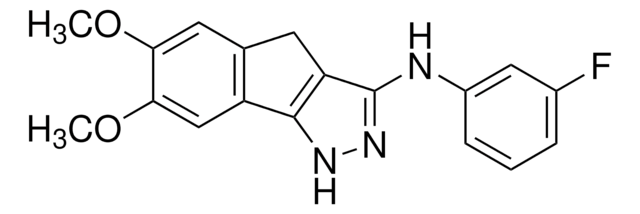SML1555
MS023 hydrochloride
≥98% (HPLC)
Synonyme(s) :
N1-((4-(4-Isopropoxyphenyl)-1H-pyrrol-3-yl)methyl)-N1-methylethane-1,2-diamine hydrochloride, N1-Methyl-N1-[[4-[4-(1-methylethoxy)phenyl]-1H-pyrrol-3-yl]methyl]-1,2-ethanediamine hydrochloride
About This Item
Produits recommandés
Niveau de qualité
Pureté
≥98% (HPLC)
Forme
powder
Conditions de stockage
desiccated
Couleur
white to light brown
Solubilité
H2O: 20 mg/mL, clear
Température de stockage
−20°C
Chaîne SMILES
CN(CCN)CC1=CNC=C1C2=CC=C(OC(C)C)C=C2.[H]Cl
InChI
1S/C17H25N3O.ClH/c1-13(2)21-16-6-4-14(5-7-16)17-11-19-10-15(17)12-20(3)9-8-18;/h4-7,10-11,13,19H,8-9,12,18H2,1-3H3;1H
Clé InChI
IEZPALXFXHDDHI-UHFFFAOYSA-N
Catégories apparentées
Actions biochimiques/physiologiques
To learn about other SGC chemical probes for epigenetic targets, visit sigma.com/sgc
Caractéristiques et avantages
Autres remarques
Code de la classe de stockage
11 - Combustible Solids
Classe de danger pour l'eau (WGK)
WGK 3
Point d'éclair (°F)
Not applicable
Point d'éclair (°C)
Not applicable
Certificats d'analyse (COA)
Recherchez un Certificats d'analyse (COA) en saisissant le numéro de lot du produit. Les numéros de lot figurent sur l'étiquette du produit après les mots "Lot" ou "Batch".
Déjà en possession de ce produit ?
Retrouvez la documentation relative aux produits que vous avez récemment achetés dans la Bibliothèque de documents.
Les clients ont également consulté
Notre équipe de scientifiques dispose d'une expérience dans tous les secteurs de la recherche, notamment en sciences de la vie, science des matériaux, synthèse chimique, chromatographie, analyse et dans de nombreux autres domaines..
Contacter notre Service technique







